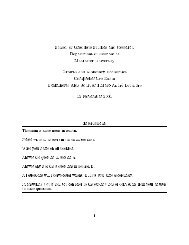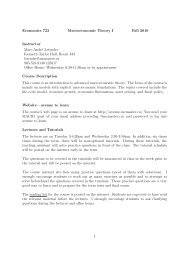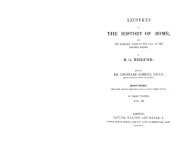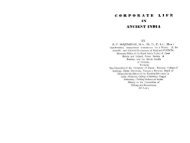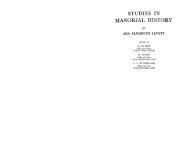Powe~ 2ndinsobordiofof ready money payments, whereby a saving of twenty ortwenty-five per cent. on the ordinary expenditure may beeffected '.Another main cause of the paralysis of the governmentwas the overgrown power <strong>an</strong>d insubordination of the nobles.thenobles. ' <strong>The</strong> two c<strong>an</strong>kers of the time were the total corruption ofthe Church, <strong>an</strong>d the utter lawlessness of the aristocracy 2.'<strong>The</strong> condition of the English Church <strong>an</strong>d the policy <strong>an</strong>drelations of the L<strong>an</strong>castri<strong>an</strong> kings towards it are subjcctswhich, however interesting, c<strong>an</strong>not be discussed here. <strong>The</strong>ydid not come within the scope of Fortescue's writings, <strong>an</strong>dif they had, his orthodoxy <strong>an</strong>d optimism would probablyhave made him averse to discussing them. But the reductionof the power <strong>an</strong>d influence of the nobles is one ofthe chief objects which he has in view, arid is the end towhich most of his reforms are directed. <strong>The</strong> d<strong>an</strong>ger tothe crown from 'over-mighty subjects' is one that is neverabsent from his mind. This therefore is a question whichmust be carefully discussed.Or~gil~ of For the origin of the evil, in the form in which ittlie e\ilEd- appears during our period, we must go back to the timeward 111. of Edward 111. <strong>The</strong> evils of the older feudalism had beensternly repressed by William I <strong>an</strong>d Henry I. Henry I1had excluded feudal principles from the framework of thegovernment. Edward I had eliminated them from theworking of the constitution. <strong>The</strong> reign of Edward I1 isa period of tr<strong>an</strong>sition during which the lords tried for amoment to recover the ground which they had lost; butthe Despencers met then1 by a combination of the Crown<strong>an</strong>d Commons, <strong>an</strong>d for the first time placed upon theStatute Book a declaration of the principles of parlia-mentary government. <strong>The</strong> long reign of Edward I11completed the work which the Despencers, from whatevermotives, had begun ; <strong>an</strong>d the Commons steadily won theirway to a legal equality with the elder estate of the' See Chaps. vi-xi, xiv, xix, xx, tion, p. lviii.below, <strong>an</strong>d the notes thereto . See below, Introduction, PartRogers' Gascoigne, Introduc- I I I.baronagc <strong>The</strong> latter could no longer dream of monopolizingthe government as they had attempted to do under Henry111.<strong>The</strong> Commons might be led, might be influenced,they could not be ignored. But though the great lordscould not hope for a de jzr!~e monopoly of power, theirinfluence de fact0 was still enormous. And it increasedullder Edward 111, largely owing to the effects of theFrench wars. <strong>The</strong> old feudal system of military service Ch<strong>an</strong>ge inbeing to a'great extent obsolete, <strong>an</strong>d being besides wholly the of mil~tnry sqsteluunsuited to the carrying on of a prolonged foreign war, service.Edward I11 introduced a new method of raising forces,whereby the Crown contracted, or, as it was called, indentedwith lords <strong>an</strong>d others for the supply of a certainnumber of men at a fixed rate of pay. Thus not only did Itsresults.the lords make profits, often very large, out of theircontracts with the government, <strong>an</strong>d enrich themselveswith prisoners <strong>an</strong>d plunder while the war lasted ; but whenthe war was over, they returned to Eng!<strong>an</strong>d at the headof b<strong>an</strong>ds of men accustomed to obey their orders, incapacitatedby long warfare for the pursuits of settled <strong>an</strong>dpeaceful life, <strong>an</strong>d ready to follow their late masters on <strong>an</strong>yturbulent enterprise. <strong>The</strong>se considerations will largelyaccount for the ease with which under Richard 11 a combinationof a few powerful nobles was able to overbear the -might of the Crown. <strong>The</strong> reign of Edward 111 was more- Pseudooverthe period of that pseudo-chivalry, which, under agarb of external splendour <strong>an</strong>d a factitious code of honour, feudal~sm.failed to conceal its ingrained lust <strong>an</strong>d cruelty, <strong>an</strong>d itsreckless contempt for the rights <strong>an</strong>d feelings of all whowere not admitted within the charmed circle; <strong>an</strong>d it sawthe beginning of that bastard feudalism, which, in place ofthe primitive relation of a lord to his ten<strong>an</strong>ts, surroundedthe great m<strong>an</strong> with a horde of retainers, who wore hislivery <strong>an</strong>d fought his battles, <strong>an</strong>d were, in the most literalSense of the words, in the law courts <strong>an</strong>d elsewhere,' Addicti jurare in verba magistri ; 'while he in turn maintained their quarrels <strong>an</strong>d shielded their
crimes from punishment'. This evil, as we shall see, rcachcdits greatest height during the L<strong>an</strong>castri<strong>an</strong> period.power <strong>The</strong> independence of the great lords thus fostered bythe tendencies of Edward 111's reign <strong>an</strong>d by the events~~''d~~n*-tcreased by which happened under Richard 11, was still further in-Henry 1V'screased by the accession of Henry 1V. To some of them,the Percies <strong>an</strong>d Arundels especially, Henry largely owedhis crown. It is true that having a great stake in themainten<strong>an</strong>ce of the government which they had set upthe lords contributed considerable sums to the support ofHenryz. But this very feeling that they were necessaryto him increased their sense of independence ; <strong>an</strong>d in 1404they showed how they construed their obligations tothe Crown, refusing to find Northumberl<strong>an</strong>d guilty oftreason for his share in the rebellion of the Percies in 1403,<strong>an</strong>d treating the matter as a mere case of private war<strong>between</strong> him <strong>an</strong>d the Earl of Westmorel<strong>an</strong>d. Even ifthis had been a colourable view to take of the affair, thissort of quasi-s<strong>an</strong>ction given to private war, a curse fromwhich Engl<strong>an</strong>d had been alrnost free from the days ofHenry 113, was of evil omen. To a private war <strong>between</strong>these very families of Percy <strong>an</strong>d Neville the <strong>an</strong>nalistWilliam Worcester traces the origin of the civil war4.Anyhow one cause of that war was this insubordinationof the aristocracy, of which private wars were but onesymptom among m<strong>an</strong>y. If, as Mr. Bright thinks 5, theCommons looked to Henry as their champion againstbaronial disorder, they must have been grievously disap-~ h ~ pointed. ~ ~ i l <strong>The</strong> evil was aggravated by the French wars ofaggravated Henry V. Causes came into operation similar to thoseg;,":h which we have traced under Edward 111 ; only here theyHenry V. acted with worse effect owing to the degeneration incharacter of the French wars themselves. <strong>The</strong> sternl ' <strong>The</strong> livery of a great lord was pp. 120 ff.as effective security to a male- ' English in Fr<strong>an</strong>ce, ii. [770]:factor as was the benefit of clergy ' Initium fuit maximorum dolorum)c the criminous clerk ; ' S. C. H. in Anglia.'111. 533. ' Bright, English History, i.P.P.C.,I.xxvii,xxxiii, 102ff. 277.8 See Allen on the Prerogative,of Henry V left no room for <strong>an</strong>y of thatgraceful chivalry which had thrown a glamour, howeversuperficial, over the warfare of Edward 111 <strong>an</strong>d his greaterson. And things became worse, when to other debasinginfluences was added the fury which is born of failure.<strong>The</strong> English lords ousted from Fr<strong>an</strong>ce returned to Engl<strong>an</strong>dat the head of b<strong>an</strong>ds of men brutalized by long warfare,demoralized by the life of camps <strong>an</strong>d garrisons, <strong>an</strong>d readyfor <strong>an</strong>y desperate adventure. Even during Henry V's lifetimethis evil had begun to show itself1, <strong>an</strong>d it did notdiminish under the weak rule of his successor2. Andthese were the men by whom the battles of the civil warswere fought.M<strong>an</strong>y of the lords were moreover enormously rich. Richesof<strong>The</strong>ir estates were concentrated in fewer h<strong>an</strong>ds, <strong>an</strong>d thel<strong>an</strong>ds of a m<strong>an</strong> like Warwick represented the accumulationsof two or three wealthy families 3. <strong>The</strong>y engrossedoffices as greedily as l<strong>an</strong>ds 4, their pensions <strong>an</strong>d<strong>an</strong>nuities exhausted the revenues of the crown6, theymade large fortunes out of the French wars which drainedthe royal exchequer6, <strong>an</strong>d they were among the chief woolgrowers<strong>an</strong>d sometimes wool-merch<strong>an</strong>ts in the kingdom7.And this wealth of the great lords appeared all the more contrastedwith thestriking when contrasted with the poverty of the crowns: povertyof<strong>an</strong>d the contrast comes out strongly in the dem<strong>an</strong>d made the C~OW~LbyFortescue, that the king shall have for his extraordinaryexpenditure more th<strong>an</strong> the revenues of <strong>an</strong>y lord", <strong>an</strong>d inthe exultation with which he declares, that if only theking's offices are really given by the king, 'the grettestlordes livelod in Engl<strong>an</strong>de mey not suffice to rewarde so' See Political Songs, -. 11. xxvii. for militarv service: Paston Let-112. ters, i. 3 jg ff.Cf. De Coussy, p. 183. Cf. Rot. Parl. iii. 497, v. 13 a,See notes to Chap. ix. below. 274 b ; English in Fr<strong>an</strong>ce, ii. 443.See notes to Chap. xvii. 'So pore a kyng was neverbe!ow.seene." See notes to Chap.vi. below. 'Nor richkre lordes all by-Cf; Gascoigne, p. I 58.dene.'Cf. Rogers' Gascoigne, Intro- -Political Songs, ii. 230 ; cf.ductlon, p. xxvi, <strong>an</strong>d the list of Rogers, Work <strong>an</strong>d Wages, p. 20.Fastolf~ claims against the crown Below, Chap. ix.C
- Page 1 and 2: OTHER WISE CALLEDThe Difference bet
- Page 3 and 4: THE work here presented to the read
- Page 5 and 6: preface. preface, xihistorical bear
- Page 7 and 8: NOTE.-AS a general rule the authori
- Page 9 and 10: xviii CLbconological Cable, QLbrono
- Page 11 and 12: INTRODUCTION.PART I.TIIE fifteenth
- Page 13 and 14: Key-note ' The key-note of the Lanc
- Page 15 and 16: 3(n troduction,His reign only as de
- Page 17: directed, and they must therefore b
- Page 21 and 22: Perversionof justice.Localoffice1 S
- Page 23 and 24: Influence use their local power to
- Page 25 and 26: houses of Parliament an oath agains
- Page 27 and 28: Tumber of action lay1. One cause of
- Page 29 and 30: The House been judged in history fo
- Page 31 and 32: does not involve the acquittal of t
- Page 33 and 34: life as ahnrrister.become possessed
- Page 35 and 36: ford Castle a prisoner named Thomas
- Page 37 and 38: Anarbitra- Wentworth and Sir John F
- Page 39 and 40: The Lancastriansretirenorthwards.Ag
- Page 41 and 42: which they said was ruining the cou
- Page 43 and 44: Illterview way alone. At Bdthune th
- Page 45 and 46: feelings the exiles received the ne
- Page 47 and 48: Requiredto write infavour ofthe Yor
- Page 49 and 50: Other come down to us for the most
- Page 51 and 52: And moche good truly gotyn hath bee
- Page 53 and 54: Date.The DeI.arrcfi6usLegurnA uglii
- Page 55 and 56: The RIS. is well and correctly writ
- Page 57 and 58: cording to Mr. Thompson, is of the
- Page 59 and 60: I'robably On the whole, the second
- Page 61 and 62: Aquinas, six I have failed to trace
- Page 63: Fortescue'scontemporaries.Littleton
- Page 66 and 67: sithpn thai had a kynge, wich was G
- Page 68 and 69:
that cause and for gret necessite w
- Page 70 and 71:
such meane. And yet of necessite th
- Page 72 and 73:
and sqviers, and oper, in also gret
- Page 74 and 75:
or by lande, pe kyng most encomptre
- Page 76 and 77:
grettest lordes off Englond, rose a
- Page 78 and 79:
as hynl liste. And by discente per
- Page 80 and 81:
haue wherwith to bie hem bowes, arr
- Page 82 and 83:
Ther is no man hanged in Scotlande
- Page 84 and 85:
e kyng be counsellyd to restrayne g
- Page 86 and 87:
pe Romans, but also is hyghnes shal
- Page 88 and 89:
muned and del~bered with his fforsa
- Page 90 and 91:
CRITICAL NOTES.CHAPTER I.P. 109. 1.
- Page 92 and 93:
Bfbe bobernance of QEnfiian'tr,CHAP
- Page 94 and 95:
1. 24. parcial] parcialite L (from
- Page 96 and 97:
for granting taxes was the same as
- Page 98 and 99:
moral philosophy, but consists of a
- Page 100 and 101:
are brought about by the sin of man
- Page 102 and 103:
note$+ QLbap. ii,regendo: non autem
- Page 104 and 105:
note$+ CCbap, ii,up in the most une
- Page 106 and 107:
Later statutes fixed the limit of l
- Page 108 and 109:
&be bobernanre of QEngIanD*applied
- Page 110 and 111:
of the household of George Duke of
- Page 112 and 113:
RgidiusRumanus.. . . homines sibi s
- Page 114 and 115:
note see Janet, i. 35 1-373, 396,42
- Page 116 and 117:
'Ordinaryand extraordinaryexpenditu
- Page 118 and 119:
p----p---3723ESTIMATED EXPENDITURE.
- Page 120 and 121:
pestifera.' Very possibly Fortescue
- Page 122 and 123:
i the clerkys off theschekquer.] Be
- Page 124 and 125:
eciting how 'the seid Duc . . . lat
- Page 126 and 127:
was defined by Parliament in 4 Edwa
- Page 128 and 129:
punish ' piratas et spoliatores mer
- Page 130 and 131:
marchandyse is lost, . . . the see
- Page 132 and 133:
Transition pensiononmg, as it was d
- Page 135 and 136:
@Lbap+ bii,commiscomissioners in gr
- Page 137 and 138:
ap1-0,Bterc,cjzt4IjAnd on the other
- Page 139 and 140:
Charleshlartel.Fall of theCarolingi
- Page 141 and 142:
the Abbey of S. Albons' (July: Past
- Page 143 and 144:
York, married Constance and Isabell
- Page 145 and 146:
Taxon France, ii. 526, 533-4, 547,
- Page 147 and 148:
499 b). And no less than ~o,ooo mar
- Page 149 and 150:
which was probably in Fortescue's m
- Page 151 and 152:
holders of such grants are however
- Page 153 and 154:
286 Cbe Booernance of Qngianb.exter
- Page 155 and 156:
teristic of the Lancastrian times,
- Page 157 and 158:
such a contenuall counsell.] ' The
- Page 159 and 160:
character which the council might p
- Page 161 and 162:
which can not counsele hym' (Append
- Page 163 and 164:
306 &be bobernance of QEnglanD.'whe
- Page 165 and 166:
Sicque horum mediis concessit tande
- Page 167 and 168:
Ebe bobernance of QEngland.qualific
- Page 169 and 170:
Controlof the exchanges.Jealousyof
- Page 171 and 172:
during good behaviour. The Master o
- Page 173 and 174:
Cbe Qiobernance of QEngIand,says: '
- Page 175 and 176:
should be Justice, Chamberlain, Cha
- Page 177 and 178:
Offices per- system of executing of
- Page 179 and 180:
Defined by (e.g. Rot. Parl. v. 2 73
- Page 181 and 182:
have been detailed in the notes to
- Page 183 and 184:
of Sir Harris Nicolas there). This
- Page 185 and 186:
iiij. lordis temporelx, or in lasse
- Page 187 and 188:
y a pretensed title, saying he ys d
- Page 189 and 190:
'every broker, brogger, andhuckster
- Page 191 and 192:
suffre, suffer, 152. 14 ; soeffre,
- Page 193 and 194:
Cade, rising of, pp. 11, 284; hisco
- Page 195 and 196:
~ .-.~--hopes entertained of him, p
- Page 197 and 198:
Franchise, question of, in medizval
- Page 199 and 200:
Loans raised by the government,pp.
- Page 201:
Pisa, Council of, p. 243. .Pitt, se



